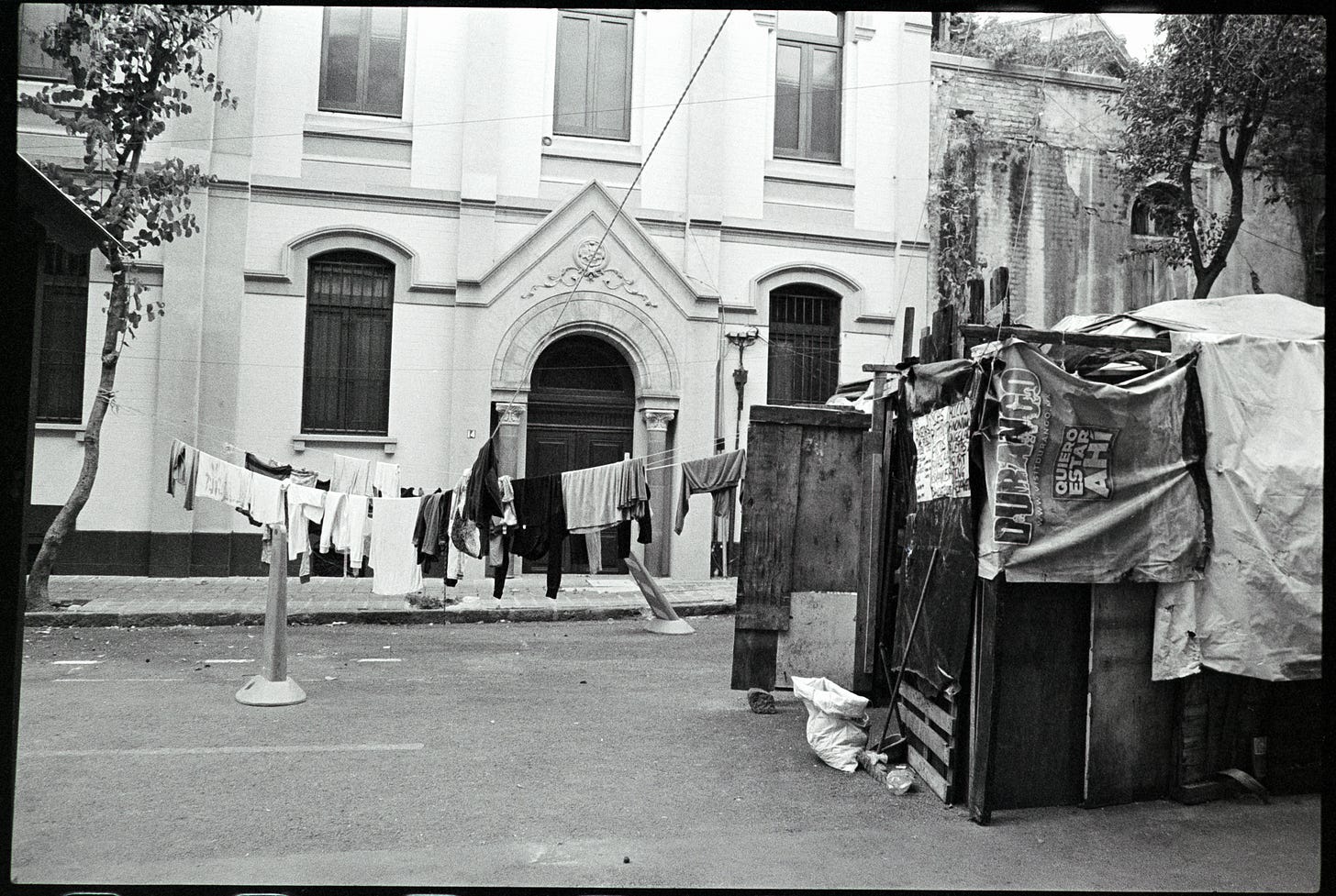Global Gentrification -- Are Digital Nomads Ruining Everything? (Part 2 of 4)
The second edition of a four-part series of Substack Letters exploring the issues, realities and impacts of digital nomads on the global gentrification landscape.
Hi everyone, welcome back to The Missive.
This month, I’m taking part in a back-and-forth exchange of ideas with one of my favorite writers and thinkers: Lauren Razavi of
All April we’re exploring the impact of digital nomadism on local communities in a series of four letters and weekly discussions on Twitter Spaces and Instagram Live.
Lauren kicked off the series last week with the piece below. We followed up with an incredible live discussion (listen back here) with experts from as far and wide as Bali, Bulgaria, Madeira, the Philippines, Montenegro and Malaysia.
Below is my response. Next week Lauren will give her take on possible solutions, and I will do the same the last week of April.
Please join us Friday on Instagram Live at 9AM PST // 10AM CDMX // 12 NYC. Lauren and I will be around to chat and answer your questions directly. Make sure you’re following both my Instagram and Lauren’s to get updates when we go live.
And if you’re new to The Missive, consider subscribing or upgrading to a paid subscription to support my work.
Let’s get into it.
Marko
Dear Lauren,
I built my career as a travel filmmaker on YouTube. In the wake of 9/11 and the Bush-era atmosphere of xenophobia, I felt that travel storytelling was a necessary tool for dispelling misconceptions and encouraging Americans to see the world themselves.
Everything changed with COVID. The problem is no longer that not enough people are traveling. It’s that remote work blurs the line between tourism and immigration while painfully underlining the fundamental inequality of globalization.
Tourists and nomads bring different impacts. Most destinations accommodate tourism in parallel to the local community via “tourist zones” with hotels and restaurants designed to for short term visitors.
Many of us hate this type of travel and want to “live like a local.” Hence the popularity of Airbnb—and the crux of the gentrification problem.
Airbnb has morphed from a home-sharing platform into a mega-business where entire neighborhoods are converted into unregulated hotels. Landlords make far more from short- than long-term rentals and will push out tenants to make space for nomads. This hollows out neighborhoods and risks displacing local communities from desirable areas entirely.
This is usually described as gentrification, but as I’ve written about previously, it’s bigger than hipsters moving to trendy neighborhoods. It’s a historical shift that is upending our assumptions about citizenship, migration, and fairness. And it warrants a more nuanced discussion than simply telling nomads to “go home.”
My home of Mexico City has emerged as an epicenter of this issue for a few reasons: it’s a short flight from the US, on the same time zone, more affordable, and very lax on visa restrictions — allowing many of US citizens to essentially move to Mexico without officially registering or paying income taxes.
The problem is not entirely new. The US and Mexico have always had a tense relationship. Wealthy gringos have been swamping Cancun for half a century and buying up property in San Miguel for just as long.
But now these factors are intersecting with technological shifts that exacerbate and export inequality while also making it more visible.
The primary force driving remote work travel is the unaffordability of major US cities. The US has a nationwide housing shortage of an estimated 4,000,000 homes – specifically affordable starter homes that help young people get ahead.
This is true in New York, Los Angeles, and across Europe, but it’s perhaps the worst in San Francisco, where the outsized profits of tech companies have turned America’s most liberal city into a symbol of inequality. Since 2020, the top 40 US cities have lost 1,000,000 young people to warmer, cheaper, less dense places. No US city lost more people than SF, none gained more than Miami. But many moved abroad.
Remote workers have brought this housing crisis with them by out-bidding locals for housing in the cheaper places they flock to. It’s bad enough when Californians move to Austin or Idaho. But Mexicans earn pesos, not dollars, and can’t simply trade places with San Franciscans.
That’s why differences in the “passport power” of “good” versus “bad” migrants is central the issue.
Take how the US government has outsourced its immigration problem to Mexico via Title 42, a Trump-era policy to expel migrants back to Mexico during the pandemic. Detention centers along the border are overflowing with migrants from Central America and Venezuela, culminating in last week’s deadly fire that killed 40 migrants. It’s a shocking juxtaposition to the government’s laissez faire policy towards nomads.
Digital nomads therefore both increase real inequality when they move to cheaper places while also representing this inequality of mobility.
This is why that tweet you mentioned about Mexico City being “magical” for remote workers went viral. Yes, Mexico City is magical for some. But this is disconnected from the hardship most locals face. And social media makes this contrast more visible than ever.
Comedian Vidura B.R. jokingly defines an immigrant as someone who moves somewhere to find a job to make life easier for their family, while an expat moves because they “like the vibe” of a place. This joke is true—the privileged few can move around the globe with unparalleled ease, while many more are left behind.
Nomads are the winners of globalization. They typically come from advanced economies that have benefitted from open borders and work in the industries of the future. By contrast, the people nomads displace often lack the skills needed to succeed in the global, digital economy.
This divergence has been happening for a while, but it has come to a head with the pandemic. While rich countries closed their borders, sent their citizens stimulus checks, and dropped interest rates to zero, citizens of poorer countries largely got stuck with the negative externalities: stalled economies, rising inflation, and a clampdown on their options to travel abroad.
The pandemic also caused many more subtle changes that are harder to pinpoint. Life is just different now for everyone. And the arrival of wealthy (primarily whiter) foreigners buying up the neighborhood can produce “future shock” and “culture shock” that makes them an easy scapegoat for more intangible changes.
But it’s not just a matter of optics. Every technological shift creates winners and losers. In geopolitics, these changing factors are known as the “geography of success.”
Remote work represents a historic shift in the geography of success towards places with fast internet, easy immigration, attractive exchange rates and comfortable lifestyles.
Similarly, when fossil fuels allowed factories to be built anywhere instead of near rivers or windmills, pre-industrial towns fell into obscurity while cities like London had the magic combo of coal, ports, and cheap labor to grow rich. Now remote work is helping places like Lisbon and Mexico City and Medellin pull ahead, while cities like San Francisco and New York experience a brain drain.
Is this good or bad? It depends on how governments respond.
In that sense, becoming a remote work hotspot is like discovering a valuable resource deposit. Sticking with the analogy of fossil fuels, both Venezuela and Dubai are oil-rich. But the latter is investing that oil boom into building a post carbon economy, while Venezuela is a failed petrostate.
Destinations will benefit from these changes only if they can channel nomad immigration into something longer-lasting—namely education and job training for future-facing industries so that the next generation of locals can perhaps join nomads.
Local policymakers should think about how to tie these policies into nomad visas while addressing the existing problems made worse by remote work.
Here in Mexico, a lack of regulation has allowed nomads to essentially live here on tourist visas, while landlords push out tenants to make room for Airbnb guests with few consequences. Portugal’s Golden Visa Program has contributed to the commodification of real estate into a speculative asset rather than a human right. In both cases, the desire of governments to attract foreign talent comes at the expense of less privileged locals. But smart policy is not enough.
We must face the most uncomfortable aspect of all — ourselves.
When I see a nomad “nesting” in a Mexico City coffee shop, it reminds me of the Laputans from Gulliver’s Travels, a society that lives on a flying island disconnected from earth. Swift describes them as technologically advanced but intellectually aloof. They are so focused on their work that they become out of touch with the realities of life on the ground. But none of us is an island.
I lay some responsibility for the situation with the culture of tech. Not all nomads work in tech, but many do. And Silicon Valley’s libertarian values have seeped into our broader culture — specifically the desire to optimize everything; portraying government regulation as more of a problem than a solution; and assuming ‘disruption’ is universally desirable.
Intentionally or not, nomads “move fast and break things” by optimizing their lifestyles at the expense of locals (inadvertently), skirting immigration rules (often with disdain for governments), and disrupting the communities that host them.
This techno-libertarianism often manifests as the crypto-bro obsession with being a ‘sovereign citizen’ responsible to no nation. But even in more subtle forms, there is an undercurrent of individualism in the nomad community that clashes with the more traditional, collectivist cultures they are visiting. Compare a nomad illegally immigrating to geo-arbitrage his salary, skirt taxes, and check off his bucket list with a poorer migrant risking her life to send back remittances to her family — who may even be at risk of being displaced by the nomad’s AirBNB.
Critics in Mexico City often label digital nomads as ‘colonizers,’ seeing them as the latest wave of invaders from overseas. While I don’t think remote workers can be compared to Cortés or the brutal subjugation of Indigenous America, it’s necessary to look at the ways in which nomads unconsciously echo colonial dynamics.
The more often nomads change places, the more likely they are to associate with fellow nomads over locals. This can create “bubbles” that breed neocolonial dynamics where foreigners expect locals to adapt to their needs, tastes, and language.
Pre-pandemic, I used to advocate for “slow travel” as the solution to over-tourism. Places like Venice were flooded by cruise ships that disgorged tens of thousands of people on a fragile environment for just a few hours. And viral Instagram images drove millions of travelers to previously obscure places to get the perfect shot.
That’s not really the issue anymore. Travel is the slowest it has been since before the Jet Age. Remote workers visit cities for months—even years—at a time, effectively migrating on tourist visas without paying into the system they are leveraging to geo-arbitrage, and leaving locals with high costs and few upsides.
Any solution requires a complete re-imagination of our notion of citizenship, which I understand is exactly what you, Lauren, are working on as part of the Plumia mission at SafetyWing.
Either we find a way to share the advantages nomads enjoy with the broader population, or we continue with a two-tiered system where the privileged few enjoy a “magical” jet-setting lifestyle of the Roaming 20s while the rest burn with resentment.
I’d love to know more about how you envision overcoming the challenges we’ve both raised and where you feel the responsibility for creating a more sustainable and just future lies. I look forward to discussing solutions in our subsequent exchange!
Until then, I remain your correspondent in Mexico,
Marko
PS: Follow
below!





I'm trying an experiment by living in my hometown as a "nomad" and it's remarkable how it changes the way this place I grew up feels. I'm sitting in the lobby of one of the newest modern hotels in the city center with a crowd of other visitors passing through and pretending for a moment that I don't know that there's an unhoused tent village across the highway or that most of my artist friends have moved outside the city. All the things I can't see from this perspective, without local attachments and a community of people doing favors for each other, make me feel like I'm floating as a moored ship in this port. I'm jealous of how carefree this view of my city feels but it also has its own poverty-- none of the richness of what I love about this place and the faces I imagined as I walked the streets as a resident is reflected here. None of the people I knew who passed away on these streets flavor the view from this new lobby window. So I end up feeling rather sorry for the folks who float through on this global surface layer, because they will never experience the type of place this is when you give up some free will and allow yourself to be planted by a community and connected to the root structure. And yet, this is a port city, so the floating part has always been as much of the heart of the place as the land-- and maybe it's me that was a bit out of touch with it. Just like theres a root network of folks embedded here, theres also networks connecting immigrant diasporas, fishing routes, cruise ships, regional metropolitan economies. So even though the view from this floating window is strange to me, maybe it's more real in a way. Both the rooted and floating views make up the richness of this place but I think perhaps they don't have a strong enough dialogue with each other-- so I'm imagining what a healthy port city would look like where the balance of the floating world and the rooted world would enrich everyone
I've often approached these discussions around digital nomads by highlighting the negative impacts of gentrification, but the longer I live in Spain, the more often I hear about the positive impact of foreign money. More often than not, it's me, not the locals, complaining about the high-rises on the beach, the groups of English lads yelling, and the big shopping complexes.
In many rural areas, housing prices are still too high for the average person to afford, and from what I understand, it has nothing to do with expats driving up prices –– there aren't expats living there in the first place. When it comes to housing prices, there are too many other factors at play to blame the digital nomads. And when it comes to the inflation of food prices, again, little to do with expats. If anything, when I hear locals complain about how much more expensive life is than in the past, they blame government policies, printing money, etc.,
Of course, I'm referring to Spain specifically, and everyone's experience is different. As far as the nomads' responsibility goes, I think slow travel is still something to focus on. Become part of the local community, go beyond the expat hangouts, spend money at local places, and learn the damn language. If you want to be a digital nomad, do it because you want to become part of another culture, not so you can show-off off all the places you've lived. And if you hate the government, complain about taxes, and you're struggling to make ends meet, you're one step towards sounding local. And if you hate the government, complain about taxes, and you're making tons of money, you're likely having the same negative impact on the countries you're visiting as you would back home. Really, it comes down to not being a douchebag, and as far as the influx of foreign money goes, "It depends on how governments respond."
Either way, I'm looking forward to reading more because I definitely don't have all the answers. These are just some thoughts.